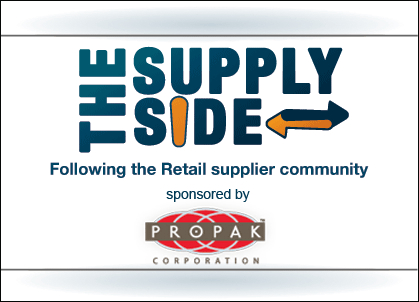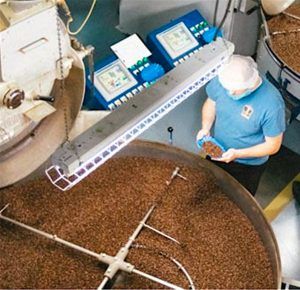The Supply Side: Westrock Coffee aiming for Walmart U.S. shelves a second time
by October 19, 2016 5:22 pm 2,088 views

Editor’s note: The Supply Side section of Talk Business & Politics focuses on the companies, organizations, issues and individuals engaged in providing products and services to retailers. The Supply Side is managed by Talk Business & Politics and sponsored by Propak Logistics.
–––––––––––––––
Little Rock-based Westrock Coffee Company knows what it’s like to get a product on Walmart U.S. shelves only to have it pulled.
But that disappointment has not prevented the mission-oriented business from growing retail distribution to Kroger, Harps, Food Lion and other regional grocers around the country over the past five years. With that retail experience behind it, Westrock is again setting its sights on Walmart and hoping for a second chance.
Elizabeth McLaughlin, Westrock’s executive vice president of marketing, told Talk Business & Politics the company is working with an advisor and plans to meet with Walmart’s coffee buyer to get Westrock branded coffee back on the shelf. It recently got the product on Walmart.com, but has yet to secure shelf space in stores.
“It’s a very crowded category and our biggest challenge is brand awareness. We don’t have a coffee shop (ready-made audience) but we have thought about it,” McLaughlin noted. “It’s just that the capital spent to get that up and running would be money that couldn’t go to growing our farmer base, which is core to the company’s mission.”
Westrock Coffee Company is not just about generating sales revenue. Founders and owners – and father and son team – Joe and Scott Ford wanted to be involved in a company with socio-economic benefits to communities in Africa. The former Alltel execs and shareholders had time on their hands when Alltel sold to Verizon in 2008. Their focus with Westrock was that giving back and supporting communities was essential.
WESTROCK ORIGINS
A happenstance meeting between Scott Ford and the president of Rwanda occurred during a family trip to Africa in early 2009 in which Ford was looking for his next business opportunity. When he heard the president of Rwanda wanted to meet, he feared the conversation would be about cell phone towers and so he tried to dodge the meeting. But after the president called his hotel room and personally asked the family to dinner at his home Ford ultimately agreed.
 The two discussed what it might take to help improve the lives of people of Rwanda to rebuild from war and genocide in that country. Four hours later Ford accepted a challenge from the Rwandan President to try and help the people of Rwanda taste the benefits of the free-market system.
The two discussed what it might take to help improve the lives of people of Rwanda to rebuild from war and genocide in that country. Four hours later Ford accepted a challenge from the Rwandan President to try and help the people of Rwanda taste the benefits of the free-market system.
During the trip Ford saw an opportunity at a washing station used by local coffee bean growers selling fresh beans for 40 cents per handful. As a former commodity trader at Stephens Inc., Ford saw an opportunity to create a crop-to-cup business model that would provide stable earnings for farmers in Rwanda. Later that year Ford purchased the Rwanda Trading Company and got into a vertically integrated coffee business on a global basis.
Westrock contracts with 80,000 growers in Rwanda, Tanzania and Ethiopia in Africa and has expanded bean sourcing to Nicaragua, Peru and Brazil in Latin America. In 2012 Westrock purchased the Tembo Trading Company in Tanzania to raise production levels. Having a transparent and ethically sourced supply chain is key to Westrock’s mission as well, which is why the company purchased Falcon Coffees Limited in the United Kingdom two years ago as way to connect roasters and farmers around the world working with partners in Africa, Asia and across Latin America. Beans grown in Africa are shipped to Little Rock and distributed from there.
GROWING WITHOUT WALMART
On a whim Ford was able to get an early coffee brand version called TradeWinds into Walmart U.S. stores and Sam’s Clubs in 2010 but sales faltered and the TradeWinds brand was pulled from the shelves. Walmart U.S. has since added national brands like Dunkin Donuts and Starbucks to their shelves – brands with large followings.
McLaughlin said it was fairly easy to get into 800 Walmart stores in 2010, but the young company wasn’t ready to handle it. She said the store locations were outside of Arkansas and the company had no branding equity. Rather than roll up the dream, McLaughlin said the company continued to expand its distribution in retail as a bean wholesaler with clients such as national chains like Starbucks and local coffee houses like Onyx in Northwest Arkansas. Today 85% of the more than 10 million pounds of beans exported from Westrock’s international mills are sold into wholesale market to roasters like Starbucks.
The remaining 15% of its production is roasted at the company’s North Little Rock plant, which has a capacity of 33 million pounds per year. The Westrock branded coffee is bagged and sold at retail in national distribution for Kroger and Food Lion, and regional grocers such as Harp’s, Hanford, Winn Dixie and Bi-Lo. Westrock also has a branded product at Amazon.com and Costco.com and more recently Walmart.com.

Westrock employs about 50 in the Little Rock area who manage the bean roasting and distribution business. While product is sourced largely from Africa, McLaughlin said the roasting is done in Little Rock and that includes a private label business for Sam’s Club.
McLaughlin said Westrock is hoping for shelf space in Walmart’s grocery aisle and now the company is better equipped to market the branded product. Westrock is the official coffee of the Denver Broncos as well as the Arkansas Razorbacks, and the company continues to expand its brand into the hospitality sector. She said this past year the company was able to double its growth rate by expanding into foodservice with a few local hospitals, while also garnering a contact with Omni and MGM Hotels and resorts around the world.
GOOD FIT
Westrock could be a good fit as a Walmart supplier when it comes to sustainability. Westrock boasts of its transparent supply chain for coffee that also benefits some of the poorest countries in the world. In Rwanda, Westrock’s business model has put more than $100 million into the pockets of small coffee farmers over the past six years, according to Westrock’s 2016 Sustainability Report.
Through Westrock’s Rwanda Trading Company, nearly 9,000 farmers have taken part in training programs in agribusiness to help increase plant yields while also caring for the land. The training provided by Westrock has helped the average family household coffee yields increase 155% over the past six years, pushing household income up 61%, according to the company.
The Tembo Coffee Company in Tanzania has followed a similar model since 2012. Westrock has been able to train more than 5,000 coffee farmers in similar agribusiness programs creating 150% growth in export volume since 2013. Westrock says 53% of the farmers in Tanzania are women. Westrock sources 40 million pounds of coffee beans annually from its contract farmers in Africa.
Westrock also has made more than $16 million in pre-harvest loans to small family farmers so the women could afford to send their children to school. Tuition is due before the harvest and families typically don’t have the money to cover school costs until after they are paid for the harvest. Ford saw an opportunity to bridge that gap and routinely makes loans to families which are paid back when the harvest comes in.
All of this “do-good” focus by Westrock gives the company a compelling story and it lines up with Wal-Mart’s broad corporate platforms on sustainability, women’s empowerment and ethical sourcing. But McLaughlin said the coffee quality will have to speak for itself.
Brad Feagins, company advisor to Walmart agreed, saying one thing he’s learned in three decades of retail is that items matter, not categories when it comes to merchandising.
McLaughlin said the owners are mission oriented when it comes to Westrock, but that doesn’t mean it’s a non-profit venture. Coffee is big business, and just last year Westrock spent $60 million sourcing coffee sustainably from around the world and hopes to buy more by growing its distribution further in 2017. Walmart could be key to making that happen, but if not, the company will continue to seek shelf space elsewhere.
“We make money and the more we make by expanding our distribution, the more we can give back farmers,” McLaughlin said.
